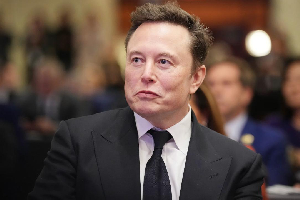Accra, June 14, GNA - The Chairman of the Parliamentary Select Committee on Environment, Science and Technology, Mr Albert Kwaku Obbin, on Monday assured Ghanaians of Parliament's support in addressing environmental issues facing the country.
He said having mere legislation to prohibit unsound environmental practices would not end the abuse, adding that, what was needed was commitment to implementation, sensitization and education. "These should be the hallmarks for achieving positive results," he told participants at a two-day workshop in Accra on the "Role and Expectation of Parliament in Integrated Coastal Area Management of Ghana".
The workshop, which attracted about 50 participants from the Environmental Protection Agency (EPA), Ministry of Finance and Economic Planning (FEP), Tema Oil Refinery (TOR) and Town and Country Planning, is to deliberate on the effects of human activities on the coastal environment.
The participants' exercise is also geared towards the configuration of a Strategic Action Programme (SAP) and the validation of the draft National Programme of Action (NPA) in the partial fulfilment of the Guinea Current Large Marine Ecosystem (GCLME) project objectives. The GCLME project involves 16 countries stretching form Senegal to Angola with common coastline problems.
Mr Obbin said polices and programmes on sustaining the environment would be seriously emphasised at all political platforms. "Parliament recognizes the need to protect our environment for sustainable development and will not relent on its responsibility to support the cause for sound environmental practices."
Mr Obbin, who is also the Member of Parliament (MP) for Prestea/Huni Valley, said the problems confronting the attainment of sustainable marine habitat were trans-boundary in nature and therefore required concerted effort, commitment and proper co-ordination among all the affected countries.
He said although the coastal area in Ghana represented only 6.5 per cent of the total land area it housed more than 60 per cent of the country's industries.
"The concentration of industries in these areas coupled with high population growth due to mass exodus of people to these zones, ostensibly to seek for better job opportunities, has resulted in increasing abuse of the marine habitat," he said.
Mr Obbin said the socio-economic implications of the destruction of the marine and coastal environment in the country were so glare and this called for immediate restoration measures.
He cited how the once productive Korle Lagoon, the pride of the Ga Mashie people, was now ecologically dead making fishermen who depended on it to look for new means of livelihood.
"The country is now importing 200 million dollars of fish annually to make up for a deficit of 320,000 tonnes," he added.
Mr. Obbin called on implementing agencies to continually make proposals for the enactment or amendment of some of the existing laws to match with the dynamics of the abuse.
He said the Environmental Select Committee would facilitate scrutiny of loans and grants meant to improve the quality of the environment "It will also continue to make recommendations for supplementary budgets for environmental policy implementation agencies in cases where the allocation from the Ministry of Finance and Economic Planning falls short of their total needs," he said. 14 June 07
General News of Thursday, 14 June 2007
Source: GNA
Parliament to address environmental concerns
Opinions











